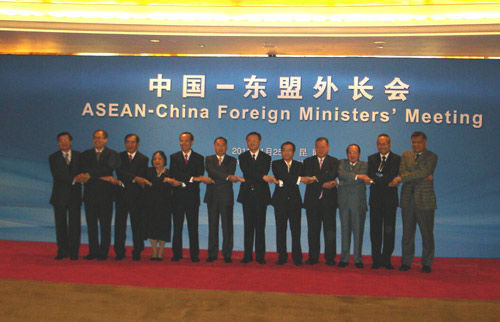China, ASEAN eye stronger ties
 |
It is in the fundamental interests of both sides to further promote China-ASEAN strategic cooperation, Foreign Minister Yang Jiechi said at the China-ASEAN foreign ministers' meeting, the first held in China.
To maintain and develop good relations with ASEAN, China is willing to work with ASEAN to implement the second five-year-plan in their strategic partnership, Yang said.
ASEAN said that it is also seeking ways to expand cooperation with China, including promoting connectivity and cultural exchanges, enhancing strategic coordination in global and regional affairs and safeguarding common interests, to promote peace, stability, development and prosperity in the region.
A common desire to further enhance cooperation was the prevailing spirit of the meeting, rather than the thorny issue of some ASEAN nations' sovereignty disputes with China over some islands in the South China Sea, as some media outlets had speculated prior to the gathering.
Yang said that both sides have similar positions on international and regional affairs and coordinate with each other to safeguard regional peace and stability.
Yang also noted that the Declaration of the Conduct of Parties in the South China Sea that the two sides jointly issued is an important contribution to promoting mutual trust and maintaining peace and stability in the South China Sea.
Analysts believe that by shunning differences and emphasizing common interests, the meeting has set a positive tone for this year's China-ASEAN relations.
China-ASEAN relations experienced fluctuations last year after certain ASEAN nations tried to bring their sovereignty disputes in the South China Sea to the multilateral level, while China as well as some ASEAN countries insisted on bilateral negotiations.
"It is not accurate to say China's relations with ASEAN have deteriorated. Both sides have made compromises. Reaching consensus benefits both sides," said Wang Yuzhu, a Southeast Asia expert at the Chinese Academy of Social Sciences.
Wang noted connectivity is a very practical and effective area for cooperation between the two sides, which "is a down-to-earth project that can truly deepen a win-win bilateral relationship".
With increased connectivity in mind, the ASEAN foreign ministers inspected the Kunming-Bangkok Highway on Monday.
Running from Kunming, the capital of southwestern China's Yunnan province, through Laos to Bangkok, the road is the shortest of the four major links between China and Southeast Asia.
Thai Foreign Minister Kasit Piromya, who was also the coordinator of the meeting, thanked the Chinese government for organizing the inspection, saying he was impressed by the quality of the road.
The inspection of the road by ASEAN foreign ministers "highlights the culmination of warm and cordial cooperation which translates into real and tangible benefits", Kanyarat Bhanthumnavin, first secretary with the Royal Thai Embassy in Beijing, told China Daily.
The meeting followed the launch of the ASEAN-China Friendship and Exchange Year, marking the 20th anniversary of China-ASEAN dialogue.
The two sides also agreed to increase people-to-people exchanges, especially among young people. China will grant 10,000 government scholarships to students from ASEAN countries by 2020.
ASEAN comprises 10 nations - Laos, Vietnam, Myanmar, Thailand, Cambodia, Singapore, Malaysia, Indonesia, Brunei and the Philippines. The two sides established "a strategic partnership for peace and prosperity" in 2003.
In January 2010, the China-ASEAN Free Trade Area took effect. Bilateral trade exceeded $292 billion in 2010. China is ASEAN's biggest trade partner and ASEAN is China's fourth-largest.
 0
0 







Go to Forum >>0 Comments